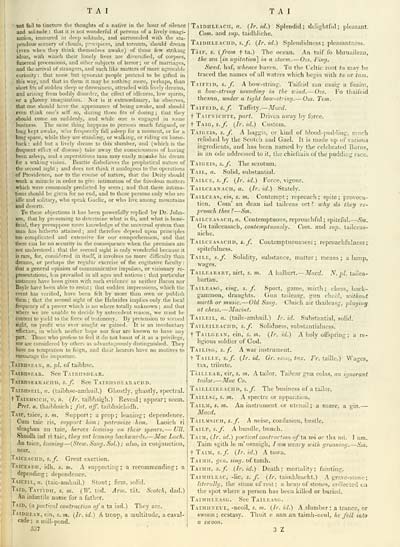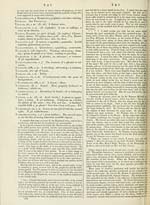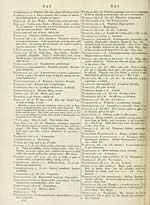Download files
Complete book:
Individual page:
Thumbnail gallery: Grid view | List view

T A I
T A I
not fall to tincture the thoughts of a native in ttie hour of silence
and solitude : that it is not wonderful if persons of a lively imagi-
nation, immured in deep solitude, and surrounded with the stu-
jwndous scenery of clouds, p~='cipices, and torrents, should dream
(even when they think themselves awake) of those few striking
ideas, with winch their lonely lives are diversified, of corpses,
funereal processions, and oilier subjects of terror; or of marriaijes,
and the arrival of strangers, and such like matters of more agreeable
curiosity : that none but ignorant people pretend to be gifted in
this way, and that in thera it may be nothing more, perhaps, than
short fits of sudden sleep or drowsiness, attemled with lively dreams,
and arising from bodily disorder, the effect of idleness, low spirits,
or a gloomy imagination. Nor is it extraordinar)-, he observes,
that one should hitve the appearance of being awsike, and should
even t';ink one's self so, during those fits of dozing; that they
should come on suddenly, and while one is engaged in some
business. The same thing happens to persons much fatigued, or
long kept awake, wh.o frequently fall asleep for a moment, or for a
long space, while tliey are standing, or walking, or riding on horse-
back : add but a lively dream to this slumber, and (which is the
frequent effect of disease) take away the consciousness of having
been asleep, and a superstitious man may easily mistake his dream
for a waking vision. Eeattie disbelieves the prophetical nature of
the second sight ; and does not think it analogous to the operations
of Providence, nor to the course of nature, that die Deity should
work a miracle in order to give intimation of the frivolous matters
which were commonly predicted by seers ; and that these intima-
tions should be given for no end, and to those persons only who are
' idle and solitary, who speak Gaelic, or who live among mountains
I and deserts.
[ To these objections it has been powerfully replied by Dr. John-
' son, that by presuming to determine what is fit, and what is bene-
ficial, they presuppose more knowledge of the universal system than
man has hitherto attained ; and therefore depend upon principles
too complicated and extensive for our comprehension, and that
there can be no security in the consequence when the premises are
not understood : that the second sight is only wonderful because it
is rare, for, considered in itself, it involves no more difficult)- than
dreams, or perhaps the regular exercise of the cogitative faculty :
that a general opinion of communicative impulses, or visionary re-
presentations, h;is prevailed in all ages and nations : tliat particular
instances have been given with such evidence as neither Bacon nor
Bayle have been able to resist ; that sudden impressions, which tlie
I event has verified, have been felt by more than own or publish
I Ihem ; thrt the second sight of the Hebrides implies only the local
' frequency of a power which is no where totally unknown ; and that
where we are unable to decide by antecedent reason, we must be
content to yield to the force of testimony. By pretension to second
sight, no profit was ever sought or gained. It is an involunfaiy
affection, in which neither hope nor fear are known to have any
part. Those who profess to feel it do not boast of it as a privilege,
nor are considered by others as advantageously distinguished. They
have no temptation to feign, and their hearers have no motives to
encourage the imposture.
T.viBnsF, AX, n. pi. of taibhse.
Taibhsear. See Taibiisdeah.
Taibhseauaciid, s. y. See Taibiisdeauaciid.
Taiehseil, n. (taibhse-amhuil.) Ghostly, ghastly, spectral.
t TAiEiisicir, I', n. (Jr. taibhsigh.) Reveal; appear; seem.
Pret. a. thaibhsich ; fiit. aff. taibhsichidh.
Taic, taice, s. 7». Support; a prop; leanins:; dependence.
Cum taic ris, support him ; patronize iiim. Laoich ri
sleaghan an taic, heroes lenninrj on their spears. — Ull.
•Shuidh iad ri taic, thejf sat kaiiing backwards. — Mac Lack.
, An taice, leaning — {Stew. Song. Sol.) ; also, in conjunction,
1 near,
Taiceaciid, s. /. Great exertion.
Taiceadh, idh, s. m. A supporting; a recommending-; a
depending ; dependence.
Taiceil, a. (taic-amhail.) Stout; firm, solid.
Tajd, Taitidii, s. m. (TF. tad. Arm. tat. Scotch, dad.)
An infantile name for a father.
Taid, (a poetical contraction o/a ta iad.) They are.
1 viDHEAX, ein, i. to. (/;■. id.) A troop, a multitude, a caval-
cade; a mill-pond.
537
Taidhleacii, a. (Ir. id.) Splendid; dclig-htful ; pleasant.
Com. and sup. taidhliche.
Taidhleaciid, s.y. {Ir. id.) Splendidness; pleasantness.
TÀIF, s. {from t ta.) The ocean. An taif Co bhruailean,
the sea [in agitation^ in a storm. — Oss. Fing.
Sived. haf, whence haven. To the Celtic root ta mav be
traced the names of all waters which begin with ta or tarn.
Taifeid, «. /. A bow-string. Taifeid san osai^; a fuaim,
a bow-string sounding in the uind. — Oss. Fo thaiieid
theann, under a tight bow-string. — Oss. Tern.
Taifeid, s.f. Taffety.— il/act/.
t Taifxiciite, part. Driven away by force.
t Taig, s.f. {Ir. id.) Custom.
Taigeis, s. f. A haggis, or kind of blood-pudding, much
relished by the Scotch and Gael. It is made up of various
ingredients, and has been named by the celebrated Burns,
in an ode addressed to it, the chieftain of the pudding race.
Taigeis, s.y. The scrotum.
Tail, a. Solid, substantial.
Tailce, s.f. {Ir. id.) Force, vigour.
Tailce.axacii, a. {Ir. id.) Stately.
Tailceas, eis, s. OT. Contempt; reproach; spite; provoca-
tion. Com' an dean iad tailceas ort '. why do tiiey re-
proach thee ? — Sm.
Tailceasacii, a. Contemptuous, reproachful ; spiteful. — Sm.
Gu tailceasach, contemptuously. Com. and sup. tailceas-
aiche.
Tailceasaciid, s.f. Contemptuousness; reproachfuluess ;
spitefulness.
Taile, s.f. Solidity, substance, matter; means; a lump,
wages.
Taileabart, airt, s. in. A halbert. — Macd. N. pi. tailea-
bartan.
Taileasg, eisg, s.f. Sport, game, mirth; chess, back-
gammon, draughts. Gun taileasg, gun chec!, without
mirth or music. — Old Song. Cluich air thaileasg, playing
at chess. — Macint.
Taileil, a. (taile-amhuil.) Ir. id. Substantial, solid.
Taileileaciid, s.f. Solidness, substantialness.
+ Tailgeax, ein, s. m. {Ir. id.) A holy offspring ; a re-
ligious soldier of God.
Tailisg, s. f. A war instrument.
t Taille, s.f. {Ir. id. Gr. to.o;, tax. Fr. taillc.) Wages,
ta.x, tribute.
TÀILLEAR, eir, s. m. A tailor. Tailear gim eolas, an ignorant
tailor. — Mac Co.
Tailleireacud, s.f. The business of a tailor.
Taillse, s. m. A spectre or apparition.
Tail.^i, s. m. An instrument or utensil; a snare, a gin. —
Macd.
Tailmsk'h, s.f. A noise, confusion, bustle.
Tailp, s.f. A bundle, bunch.
Ta!M, (Ir. id.) poetical contraction ofta mi or tha mi. I am.
Taim sgith le m'osnaigh, I am weary with groaning. — Sm.
t Taim, s.f. {Ir. id.) A town.
Tai.mh, gen. sinjr. of tamh.
Taimii, 5./. {Ir. id.) Death; mortality; fainting.
Taimiileac, -lie, s. /. {Ir. taimhleacht.) A grave-stone;
literally, the stone of rest ; a heap of stones, collected on
the spot where a per.son has been killed or buried.
Taimiileasg. See Taileasg.
Taimiixeul, -neoil, s. m. {Ir. id.) A slumber ; a trance, or
swoon; ecstasy. Thuit e ann iin taimh-neul, he fell into
a swoon.
3 Z
T A I
not fall to tincture the thoughts of a native in ttie hour of silence
and solitude : that it is not wonderful if persons of a lively imagi-
nation, immured in deep solitude, and surrounded with the stu-
jwndous scenery of clouds, p~='cipices, and torrents, should dream
(even when they think themselves awake) of those few striking
ideas, with winch their lonely lives are diversified, of corpses,
funereal processions, and oilier subjects of terror; or of marriaijes,
and the arrival of strangers, and such like matters of more agreeable
curiosity : that none but ignorant people pretend to be gifted in
this way, and that in thera it may be nothing more, perhaps, than
short fits of sudden sleep or drowsiness, attemled with lively dreams,
and arising from bodily disorder, the effect of idleness, low spirits,
or a gloomy imagination. Nor is it extraordinar)-, he observes,
that one should hitve the appearance of being awsike, and should
even t';ink one's self so, during those fits of dozing; that they
should come on suddenly, and while one is engaged in some
business. The same thing happens to persons much fatigued, or
long kept awake, wh.o frequently fall asleep for a moment, or for a
long space, while tliey are standing, or walking, or riding on horse-
back : add but a lively dream to this slumber, and (which is the
frequent effect of disease) take away the consciousness of having
been asleep, and a superstitious man may easily mistake his dream
for a waking vision. Eeattie disbelieves the prophetical nature of
the second sight ; and does not think it analogous to the operations
of Providence, nor to the course of nature, that die Deity should
work a miracle in order to give intimation of the frivolous matters
which were commonly predicted by seers ; and that these intima-
tions should be given for no end, and to those persons only who are
' idle and solitary, who speak Gaelic, or who live among mountains
I and deserts.
[ To these objections it has been powerfully replied by Dr. John-
' son, that by presuming to determine what is fit, and what is bene-
ficial, they presuppose more knowledge of the universal system than
man has hitherto attained ; and therefore depend upon principles
too complicated and extensive for our comprehension, and that
there can be no security in the consequence when the premises are
not understood : that the second sight is only wonderful because it
is rare, for, considered in itself, it involves no more difficult)- than
dreams, or perhaps the regular exercise of the cogitative faculty :
that a general opinion of communicative impulses, or visionary re-
presentations, h;is prevailed in all ages and nations : tliat particular
instances have been given with such evidence as neither Bacon nor
Bayle have been able to resist ; that sudden impressions, which tlie
I event has verified, have been felt by more than own or publish
I Ihem ; thrt the second sight of the Hebrides implies only the local
' frequency of a power which is no where totally unknown ; and that
where we are unable to decide by antecedent reason, we must be
content to yield to the force of testimony. By pretension to second
sight, no profit was ever sought or gained. It is an involunfaiy
affection, in which neither hope nor fear are known to have any
part. Those who profess to feel it do not boast of it as a privilege,
nor are considered by others as advantageously distinguished. They
have no temptation to feign, and their hearers have no motives to
encourage the imposture.
T.viBnsF, AX, n. pi. of taibhse.
Taibhsear. See Taibiisdeah.
Taibhseauaciid, s. y. See Taibiisdeauaciid.
Taiehseil, n. (taibhse-amhuil.) Ghostly, ghastly, spectral.
t TAiEiisicir, I', n. (Jr. taibhsigh.) Reveal; appear; seem.
Pret. a. thaibhsich ; fiit. aff. taibhsichidh.
Taic, taice, s. 7». Support; a prop; leanins:; dependence.
Cum taic ris, support him ; patronize iiim. Laoich ri
sleaghan an taic, heroes lenninrj on their spears. — Ull.
•Shuidh iad ri taic, thejf sat kaiiing backwards. — Mac Lack.
, An taice, leaning — {Stew. Song. Sol.) ; also, in conjunction,
1 near,
Taiceaciid, s. /. Great exertion.
Taiceadh, idh, s. m. A supporting; a recommending-; a
depending ; dependence.
Taiceil, a. (taic-amhail.) Stout; firm, solid.
Tajd, Taitidii, s. m. (TF. tad. Arm. tat. Scotch, dad.)
An infantile name for a father.
Taid, (a poetical contraction o/a ta iad.) They are.
1 viDHEAX, ein, i. to. (/;■. id.) A troop, a multitude, a caval-
cade; a mill-pond.
537
Taidhleacii, a. (Ir. id.) Splendid; dclig-htful ; pleasant.
Com. and sup. taidhliche.
Taidhleaciid, s.y. {Ir. id.) Splendidness; pleasantness.
TÀIF, s. {from t ta.) The ocean. An taif Co bhruailean,
the sea [in agitation^ in a storm. — Oss. Fing.
Sived. haf, whence haven. To the Celtic root ta mav be
traced the names of all waters which begin with ta or tarn.
Taifeid, «. /. A bow-string. Taifeid san osai^; a fuaim,
a bow-string sounding in the uind. — Oss. Fo thaiieid
theann, under a tight bow-string. — Oss. Tern.
Taifeid, s.f. Taffety.— il/act/.
t Taifxiciite, part. Driven away by force.
t Taig, s.f. {Ir. id.) Custom.
Taigeis, s. f. A haggis, or kind of blood-pudding, much
relished by the Scotch and Gael. It is made up of various
ingredients, and has been named by the celebrated Burns,
in an ode addressed to it, the chieftain of the pudding race.
Taigeis, s.y. The scrotum.
Tail, a. Solid, substantial.
Tailce, s.f. {Ir. id.) Force, vigour.
Tailce.axacii, a. {Ir. id.) Stately.
Tailceas, eis, s. OT. Contempt; reproach; spite; provoca-
tion. Com' an dean iad tailceas ort '. why do tiiey re-
proach thee ? — Sm.
Tailceasacii, a. Contemptuous, reproachful ; spiteful. — Sm.
Gu tailceasach, contemptuously. Com. and sup. tailceas-
aiche.
Tailceasaciid, s.f. Contemptuousness; reproachfuluess ;
spitefulness.
Taile, s.f. Solidity, substance, matter; means; a lump,
wages.
Taileabart, airt, s. in. A halbert. — Macd. N. pi. tailea-
bartan.
Taileasg, eisg, s.f. Sport, game, mirth; chess, back-
gammon, draughts. Gun taileasg, gun chec!, without
mirth or music. — Old Song. Cluich air thaileasg, playing
at chess. — Macint.
Taileil, a. (taile-amhuil.) Ir. id. Substantial, solid.
Taileileaciid, s.f. Solidness, substantialness.
+ Tailgeax, ein, s. m. {Ir. id.) A holy offspring ; a re-
ligious soldier of God.
Tailisg, s. f. A war instrument.
t Taille, s.f. {Ir. id. Gr. to.o;, tax. Fr. taillc.) Wages,
ta.x, tribute.
TÀILLEAR, eir, s. m. A tailor. Tailear gim eolas, an ignorant
tailor. — Mac Co.
Tailleireacud, s.f. The business of a tailor.
Taillse, s. m. A spectre or apparition.
Tail.^i, s. m. An instrument or utensil; a snare, a gin. —
Macd.
Tailmsk'h, s.f. A noise, confusion, bustle.
Tailp, s.f. A bundle, bunch.
Ta!M, (Ir. id.) poetical contraction ofta mi or tha mi. I am.
Taim sgith le m'osnaigh, I am weary with groaning. — Sm.
t Taim, s.f. {Ir. id.) A town.
Tai.mh, gen. sinjr. of tamh.
Taimii, 5./. {Ir. id.) Death; mortality; fainting.
Taimiileac, -lie, s. /. {Ir. taimhleacht.) A grave-stone;
literally, the stone of rest ; a heap of stones, collected on
the spot where a per.son has been killed or buried.
Taimiileasg. See Taileasg.
Taimiixeul, -neoil, s. m. {Ir. id.) A slumber ; a trance, or
swoon; ecstasy. Thuit e ann iin taimh-neul, he fell into
a swoon.
3 Z
Set display mode to: Large image | Transcription
Images and transcriptions on this page, including medium image downloads, may be used under the Creative Commons Attribution 4.0 International Licence unless otherwise stated. ![]()
| Early Gaelic Book Collections > J. F. Campbell Collection > Gaelic dictionary, in two parts > (659) |
|---|
| Permanent URL | https://digital.nls.uk/79305982 |
|---|
| Description | Volumes from a collection of 610 books rich in Highland folklore, Ossianic literature and other Celtic subjects. Many of the books annotated by John Francis Campbell of Islay, who assembled the collection. |
|---|
| Description | Selected items from five 'Special and Named Printed Collections'. Includes books in Gaelic and other Celtic languages, works about the Gaels, their languages, literature, culture and history. |
|---|

